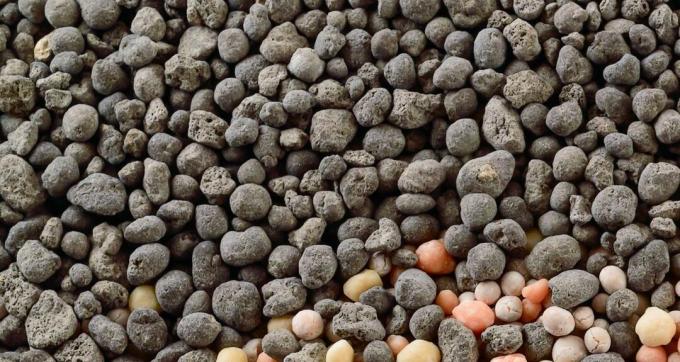Although calcium cyanamide fertilizer is harmful to health, it is still used. We explain the disadvantages of the fertilizer and show alternatives.

Calcium cyanamide combines the fertilization of nitrogen with the liming of the soil and a broad fight against harmful organisms. What seems sensible at first glance and is also advertised by distributors of the fertilizer bedrock, however, as we will show you, also has some significant disadvantages.
contents
- What is calcium cyanamide fertilizer?
-
How does calcium cyanamide fertilizer work?
- Lime effect
- Nitrogen effect
- Hygienic effect
- Disadvantages of calcium cyanamide fertilizer
- Alternatives to calcium cyanamide fertilizers
What is calcium cyanamide fertilizer?
The chemical name of calcium cyanamide is calcium cyanamide (CaNCN or CaCN2). The dirty gray-black powder or granulate has been produced for over 100 years by binding atmospheric nitrogen to calcium carbide at high temperatures and with high energy consumption. 19.8% of the substance is nitrogen, 60% calcium oxide, the rest consists of carbon and often impurities such as iron and aluminum. Because calcium cyanamide brings in not only nitrogen, but also lime and also a herbicidal, Has bactericidal and fungicidal effects, it can be used as a multifunctional nitrogen fertilizer describe.
How does calcium cyanamide fertilizer work?
Calcium cyanamide is activated in the soil when it comes into contact with liquid water. The reaction also takes place at cool temperatures. In the following we distinguish three different effects of calcium cyanamide fertilizer.
Lime effect
Calcium hydroxide (slaked lime) is formed, which is easily soluble and can quickly raise the pH value of the soil or be absorbed by plants. A third of the lime contained is in the form of slower-acting lime forms. The liming of the upper soil layer improves the soil structure, ensures stable crumbs, better ventilation and water absorption of the soil and also stimulates soil respiration. The pH of the soil is raised. The lime effect corresponds to 60% CaO, so calcium cyanamide can be treated like lime with 60 grams of calcium oxide in 100 grams.

Nitrogen effect
After the solution, the nitrogen lies as cyanamide (H.2CN2) before. After a few days, this is converted into urea and - to a lesser extent - dicyandiamide (DCD). While urea soon becomes plant-available ammonium and nitrate, DCD remains in the soil for longer without being converted. In this way a long-term effect is achieved and the fertilized nitrogen is less prone to leaching.
Hygienic effect
Cyanamid acts in the top three to four centimeters of the soil against many weeds and their seeds Nudibranchs, Wireworms and numerous soil-borne fungi, such as plasmodia, i.e. single-cell parasites of the Carbonic hernia (Plasmodiophora brassicae). This effect is temporary, however, because the cyanamide continues to be converted.
Disadvantages of calcium cyanamide fertilizer
In 2016, an opinion by the EU health authority found that calcium cyanamide can damage human health and contaminate surface and groundwater. This applies both to the application methods recommended by the manufacturers and to the improved application methods. In addition, due to the absorption of cyanamide - for example as dust - it can lead to the so-called Calcium cyanamide disease come: The cyanamide inhibits the acetaldehyde dehydrogenase, which is responsible for the breakdown of acetaldehyde in the Blood is responsible. Acetaldehyde is a breakdown product of ethanol (drinking alcohol) and leads to dizziness, nausea and hot flashes. If alcohol is consumed after consuming cyanamide, one experiences an incredibly bad, long-lasting hangover even with small amounts, as the acetaldehyde accumulates in the blood. When used properly - especially by wearing a face mask - a sufficiently large absorption of cyanamide is prevented. Because calcium cyanamide fertilizer is corrosive, gloves should be worn when applying.

The versatile nitrogen fertilizer has other disadvantages: It has a strong effect Humus-consuming, because it stimulates the bacterial life in the soil for some by increasing the pH value Weeks. These organisms consume large amounts of carbon to produce energy. However, because calcium cyanamide does not provide an organic, carbon-rich material as a substrate, the bacteria attack the soil's own carbon, the humus. At the same time, fungi, which are also extremely important soil formers, are damaged by the sudden rise in pH. Since various fungi are in symbiosis with our plants, this cannot be an advantage for us. And of course there is also the biocidal effect of the cyanamide in addition to this effect: Of course, this does not differentiate between harmful and beneficial bacteria, fungi and plants - like a chemical club, it cuts a wide gap in this Soil life.
Alternatives to calcium cyanamide fertilizers
The nitrogen requirement of soils is becoming much more resource-conserving, natural and soil-compatible with the help of primarily organic fertilizers - such as ours Plantura organic fertilizers - covered. However, if you absolutely want to use calcium cyanamide - for example to avoid having to dispose of old supplies - we urgently recommend determining the pH value of your soil beforehand so that it does not reach heights that are incompatible with plants to drive. The parallel incorporation of stable organic material such as straw, bark humus or bark mulch helps humus to protect in the ground. An alternative to the broad biocidal effect of calcium cyanamide is targeted control and, in some cases, benevolent tolerance of organisms that do not necessarily bring us a direct benefit in the home garden, but which, without exception, have an ecological benefit fulfill.
More information about our environmentally friendly Plantura organic fertilizers You will find here.
